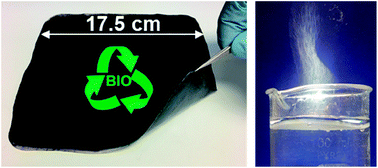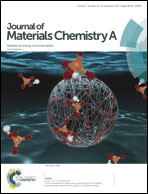Polydopamine-filled bacterial nanocellulose as a biodegradable interfacial photothermal evaporator for highly efficient solar steam generation†
Abstract
Solar steam generation by heat localization is considered to be a highly efficient, sustainable way to alleviate water shortage in resource-limited regions. However, most of the interfacial photothermal evaporators demonstrated so far involve non-biodegradable nanoscale materials, which can quickly pose a significant threat to the environment and ecosystems, especially marine ecosystems, after their disposal. For the first time, a flexible, scalable and, more importantly, completely biodegradable photothermal evaporator for highly efficient solar steam generation is introduced. The bilayered evaporator is comprised of bacterial nanocellulose (BNC) densely loaded with polydopamine (PDA) particles during its growth. The biodegradable foam introduced here exhibits large light absorption and photothermal conversion, heat localization, and efficient water transportation, leading to an excellent solar steam generation performance under one sun (efficiency of ∼78%). The novel material and scalable process demonstrated here can be a sustainable solution to alleviate the global water crisis.



 Please wait while we load your content...
Please wait while we load your content...